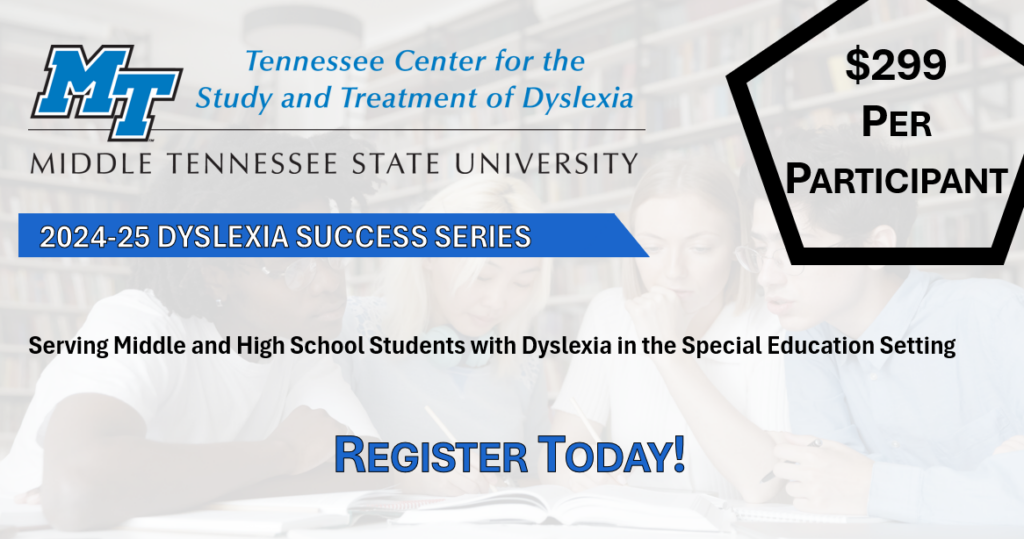Tennessee Center for the Study and Treatment of Dyslexia
2024-25 Dyslexia Success Series

About this Series
Dyslexia is a Specific Learning Disability (SLD) in Basic Reading Skills and/or Reading Fluency. Students with an SLD in Reading Comprehension may also have word-level weaknesses contributing to their reading difficulty. In addition, students with dyslexia often have difficulties with written expression. As a special educator, you are likely sought out as a source of knowledge about dyslexia. Your colleagues rely on you for guidance on how to provide intensive intervention and supports for students with characteristics of dyslexia, based on student need.
This professional learning series builds both knowledge and practical skills for those who teach middle and high school students with intensive literacy needs. Participants will be enrolled in Blackboard Ultra, our online learning management system (LMS), which provides access to short, pre-recorded videos and readings. This online content provides important background knowledge that will prepare participants for monthly in-person meetings on campus. Building this foundational knowledge prior to each in-person session enables the instructors to use class time to dive into case studies and teaching strategies.*
You will learn how to provide multi-component literacy intervention for middle and high school students. Instructional resources and tools derived from evidence-based practices will be shared and modeled. These can be used to supplement and/or bolster your existing reading intervention program.
Classes meet at MTSU one Saturday per month from 9:00 am – 12:00 pm Central.
Each session has a distinct yet interconnected focus. Below are the date and a brief description of each session:
September 21, 2024: Dyslexia as a Learning Disability
Various terms are used to describe reading and writing difficulties, and this can cause confusion for parents and educators. In this session, we will discuss terms like dyslexia and characteristics of dyslexia and their relationship to specific learning disabilities. You will also learn about conditions that can co-occur with learning disabilities. Using assessment data to determine literacy strengths and needs will be discussed, with a focus on identifying instructional targets. You will examine case studies and practice using data to inform your instructional decision-making.
October 19, 2024: Improving Multisyllable Word Reading Using Authentic Texts
Build your knowledge about how the increasing complexity and integration of phonemes, graphemes, syllables, and morphemes impact reading and writing development. You will learn the essential sub-skills students need to decode long words. You will also learn an explicit routine to support your students with multisyllable word reading, as well as a variety of ways to provide the practice needed to become accurate and automatic with word reading. When your students’ word level reading becomes automatic, they can focus on text comprehension. Strategies will be modeled and practiced using authentic, grade-level vocabulary and text.
November 23, 2024: Spelling Multisyllable Words
You will continue to build and apply your knowledge about syllable patterns (including unstressed syllables and their unique challenges for spelling), as well as high-utility spelling rules and vocabulary knowledge as contributors to accurate spelling. You will learn how to teach students to spell multisyllable words while integrating scaffolds that strengthen weak foundational subskills, such as phonemic awareness, phonics, syllabication, and morphology.
December 14, 2024: Text Reading Fluency in Support of Comprehension
The goal of fluency instruction is to strengthen your students’ comprehension. You will learn how to plan purposeful repeated reading activities that use academic text while integrating word reading practice, vocabulary knowledge, and text comprehension. We’ll examine how practicing with a wide variety of text types (e.g., topics, vocabulary, syntax) can improve reading fluency.
January 25, 2025: Improving Reading Comprehension: Vocabulary and Academic Knowledge
Students with dyslexia have a primary weakness with skills related to word reading and spelling. Accurate and automatic word reading is necessary for text comprehension, so many students who have been identified with a deficit in basic reading or reading fluency also need support with reading comprehension. A multicomponent approach to reading intervention is emphasized in this session. Instruction that supports the development of oral language comprehension, vocabulary development, self-monitoring, and reading comprehension will be detailed.
February 22, 2025: Written Expression
Written expression relies on a complex interconnection of literacy and cognitive planning skills. Many students with dyslexia have trouble with writing. This session will focus on sentence-level intervention, featuring evidence-based strategies such as sentence combining, sentence structures, semantic features, and self-regulation skills. Proficient reading and writing rely on overlapping skills, so a multicomponent approach that includes written expression can enhance both areas of literacy.
This series is geared toward special educators in the middle and high school setting. Interventionists, administrators, school psychologists, speech language pathologists, and other educators who work with intensive reading intervention are encouraged to attend, as well!
*Note: Each participant must complete a brief knowledge check after engaging with the online material. An hour of attendance will be certified for each online session, based on the engagement analytics provided by the LMS. You must attend the in-person session for each date in order to benefit from application of the information and to earn a certificate of attendance.
Cost: $299 for up to 25 hours of attendance credit
Course Instructors
Melinda Hirschmann, Ed.D., CALT

Melinda.Hirschmann@mtsu.edu
Assistant Director for Educational Services and School Outreach
As Assistant Director for Educational Services and School Outreach at the Tennessee Center for the Study and Treatment of Dyslexia, Melinda collaborates with schools to support professional learning regarding literacy instruction and intervention for educators and their students in grades K-12. She also teaches undergraduate and graduate courses as an adjunct professor for the College of Education at Middle Tennessee State University. She earned her Master of Education degree in Special Education from Tennessee State University and her Doctor of Education degree from Lipscomb University. She had the pleasure and challenge of working with adolescent students as a middle school special education reading interventionist for 10 years. Melinda is a Certified Academic Language Therapist and has tutored elementary children using intensive structured literacy instruction. She also administers and supervises student assessments for characteristics of dyslexia. Melinda serves on the board of the Tennessee branch of the International Dyslexia Association.
Erin Alexander, Ed.S., NCSP, CALT

Erin.Alexander@mtsu.edu
Assistant Director for Clinical Services
Erin Alexander is the Assistant Director for Clinical Services at the Tennessee Center for the Study and Treatment of Dyslexia at Middle Tennessee State University. She trains and supervises graduate students who conduct assessments at the center, consults with parents and school personnel regarding how to best identify and support students with reading difficulties, provides workshops for parents, and delivers professional development to school personnel. She earned her B.S. in psychology, M.A. in school psychology, and Ed.S. in curriculum and instruction/school psychology from Middle Tennessee State University. She is a Nationally Certified School Psychologist (NCSP) and a licensed school psychologist through the TN Department of Education. Her previous experience includes serving on the board of the Tennessee branch of the International Dyslexia Association and working in the public schools in Tennessee as a school psychologist. Erin is also a Certified Academic Language Therapist (CALT) who has provided intervention to students with characteristics of dyslexia. She is an ex-officio member of the Tennessee Dyslexia Advisory Council, which was established in 2016 to advise the Tennessee Department of Education on matters related to dyslexia.
